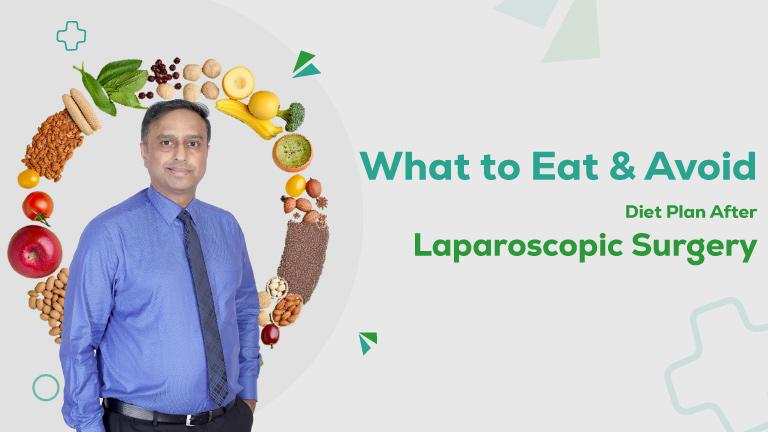Foods to EAT After Laparoscopic Surgery
Hydration: Staying hydrated is crucial for recovery. Drink plenty of water throughout the day.
Protein: Protein is essential for wound healing and tissue repair. Include lean sources of protein like poultry, fish, eggs, legumes, tofu, and low-fat dairy in your meals.
Fiber: Gradually reintroduce fiber to prevent constipation. Choose whole grains, fruits, vegetables, and legumes. However, start with small portions and increase as your body tolerates them.
Vitamins and Minerals: Consume a variety of fruits and vegetables to ensure you’re getting a range of vitamins and minerals that aid in healing and immune function.
Healthy Fats: Include nuts, avocados, and olive oil for healthy fat and support overall health.
Small, Frequent Meals: Instead of large meals, opt for smaller, more frequent meals to prevent putting excess strain on your digestive system.
Soft Foods: Initially, focus on easily digestible foods like soups, pureed vegetables, yogurt, and smoothies.
Bone Health: Include sources of calcium and vitamin D to promote bone healing. This can include dairy products, fortified plant-based milk, leafy greens, and fatty fish.
NOTE: If you experience any discomfort or digestive issues with any of the above-mentioned foods, adjust your diet accordingly.
Foods to AVOID After Laparoscopic Surgery
Fried and Greasy Foods: These can be harder to digest and may cause discomfort.
Highly Processed Foods: Foods high in sugar, salt, and unhealthy fats might slow down your recovery and increase inflammation.
Spicy Foods: Spices can irritate the digestive tract, so it’s best to avoid highly spiced foods initially.
Carbonated Beverages: These can cause bloating and discomfort, so it’s wise to avoid them for a while.
Alcohol: Alcohol can interfere with the healing process and might interact with any pain medications you’re taking.
Heavy Dairy: Avoid excessive consumption of high-fat dairy products, as they can be harder to digest for some people.
Tough and Fibrous Foods: Foods like raw vegetables, whole grains, and tough meats can strain your digestive system, so introduce them gradually.
Diet plan to follow after Laparoscopic or Keyhole Surgery
Here’s a sample diet plan to follow after laparoscopic surgery: Remember that this plan is a general guideline, and you should adjust it based on your specific dietary needs, preferences, and any recommendations from your healthcare provider.
Breakfast:
- Scrambled eggs with spinach and a sprinkle of cheese (if tolerated)
- Whole grain toast or oatmeal
- Herbal tea or decaffeinated beverage
Mid-Morning Snack:
- Greek yogurt with a drizzle of honey and some sliced fruits
Lunch:
- Grilled chicken or tofu salad with mixed greens, cucumber, carrots, and a light vinaigrette dressing
- Quinoa or brown rice on the side for added fiber and protein
- Water or a diluted fruit juice
Afternoon Snack:
- Sliced apple with a small portion of nut butter
Dinner:
- Baked or poached fish (such as salmon or tilapia) with a lemon-dill sauce
- Steamed or roasted vegetables (e.g., broccoli, carrots)
- Mashed sweet potatoes or a small serving of whole-grain pasta
- Herbal tea or water
Evening Snack:
- A small handful of nuts and dried fruits for a balanced, nutrient-dense snack
Hydration Alert: Throughout the day, aim to drink plenty of water to stay hydrated. You can also include herbal teas, diluted fruit juices, and clear broths.
Tips for Effective Eating Process After Laparoscopic Surgery:
- Small, Frequent Meals: Eat smaller, more frequent meals to prevent overloading your digestive system and maintain energy levels.
- Chew Thoroughly: Take your time to chew your food well to aid digestion.
- Listen to Your Body: Pay attention to hunger and fullness cues, and eat only until you’re comfortably satisfied.
- Avoid Straws: Drinking through a straw can introduce extra air into your digestive system, leading to gas and discomfort.
- Gradually Introduce Foods: Start with easily digestible foods and gradually reintroduce more complex foods as tolerated.
- Medication and Supplements: Follow your healthcare provider’s recommendations regarding medication and any necessary supplements.
- Stay Active: Light physical activity, as recommended by your healthcare provider, can aid digestion and promote overall recovery.
Wrap-up Tips on the Diet After Laparoscopic Surgery:
Your post-surgery diet plan should extend over the course of your recovery period, gradually incorporating more diverse and complex foods as you feel comfortable. If you have any dietary concerns or restrictions, always prioritize open communication with your healthcare provider and adhere to their recommendations for optimal recovery.
Dr. Sunil Tibrewal is one of the most highly experienced laparoscopic surgeons in India, assisting at every stage of the medical procedure, i.e., from consultation to cure, with a team of expert dieticians to understand your dietary needs.






